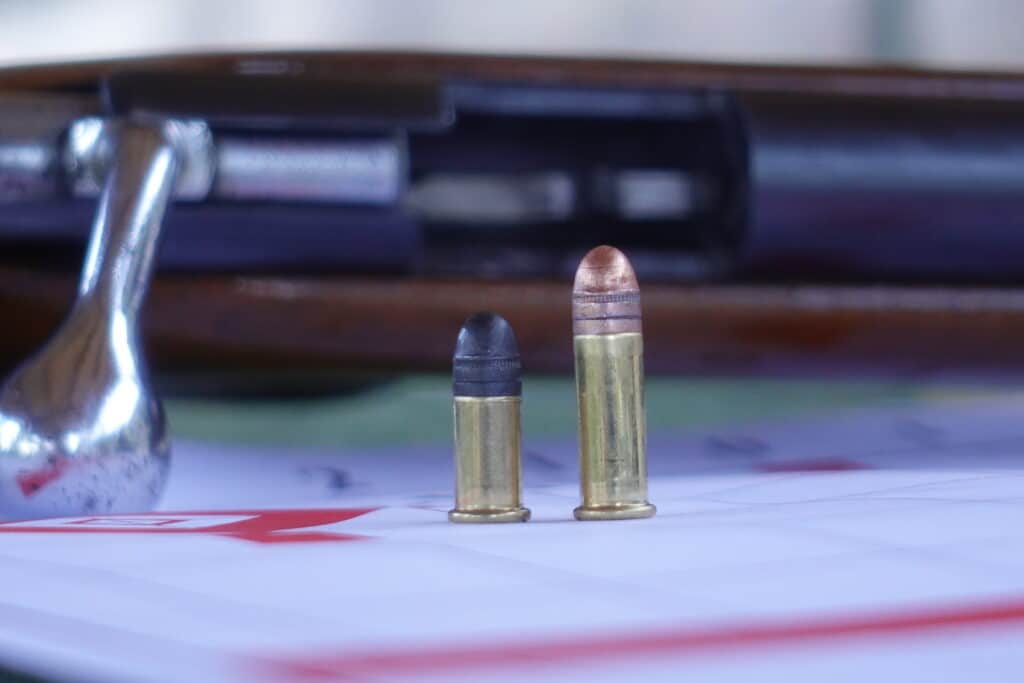
The .22 Short and the .22 Long are some of the oldest American metallic cartridges around, being invented in 1857 and 1871 respectively. Unlike other early rimfire designs, the .22 caliber options can still be found today. The problem is, it is hard to find rifles chambered in these cartridges, so a natural question to ask is can a rifle use both .22 Short and .22 Long?
Generally, .22 Short, .22 Long, and .22 Long Rifle can be safely used in the same firearms. However, some designs such as semi-automatic rifles may not cycle reliably due to lower gas pressures.
How can these cartridges be used in the same rifles? Unlike most modern centerfire cartridge designs, .22 rimfires technically straight wall designs. The only dimension which varies between the Short, Long, and Long Rifle is the length of the case and overall length. When chambered, the bullets aren’t fitted into the throat of the barrel and instead must move slightly forward before engaging the rifling.
A Brief History of .22 Rimfires
In the later half of the 19th Century, firearms manufacturers were making the transition from muzzle-loading projectiles to metallic cartridges. The Alamo in 1836 was fought with long rifles using percussion caps and flintlocks. By 1898 when Teddy Roosevelt was blazing his way through Cuba the official US military cartridge was the .30-40 Krag. In between, US firearms underwent a remarkable evolution.
This is where the .22 rimfire calibers come into play. Rimfire cartridges were an early metallic design and the link between the modern metallic cartridges we have today and the early paper cartridges used before 1850. There are also cartridges known as “pinfire” which were mostly composed of paper but this design was really a paper cartridge with a percussion cap at the base rather than a metallic design.
The .22 Short was conceived in 1857 primarily as a personal-defense round and for use in gallery guns which per popular at fairs of the time. It consists of a .222 caliber bullet between 25 and 30 grains in a rimmed case 0.421 inches long containing 4 grains of black powder. The .22 Long uses the same bullet in a case 0.613 inches long using 5 grains of black powder.
In contrast, the .22 LR uses a .222 caliber bullet between 30 and 40 grains in the same case as the .22 Long but with 6 grains of powder. All three share the same specs, though the .22LR is faster and has more energy. In a classic case of ‘third time’s the charm’, the .22LR took off like wildfire and has remained popular to this day.
Given the immense popularity of the .22 Long Rifle cartridge, this brings up an important question. Why go with older, slower, and more expensive cartridges?
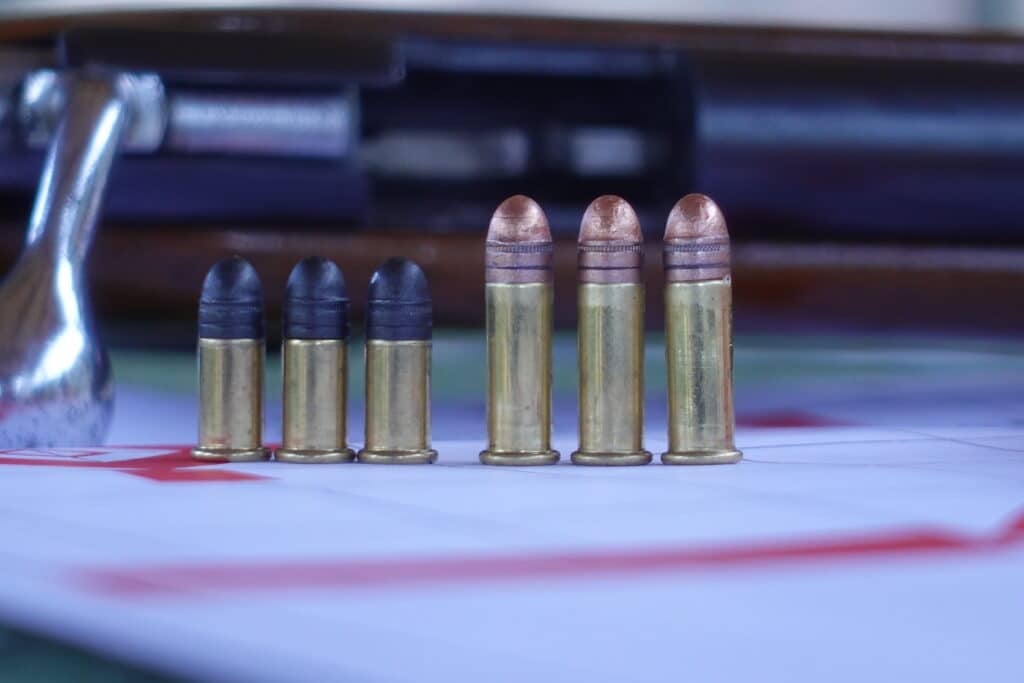
A Couple of Benefits
Using the .22 Short and the .22 Long does have a couple of advantages. To start with, more ammunition of both can be stored. Bulk rimfire ammo is often bought and stored in buckets and boxes. Just like with nails and screws, a slightly shorter overall length means the same bucket can hold more rounds and sometimes will even weigh less.
Let’s be real here though, most people aren’t going to go through a trash can full of .22 rimfire cartridges in any reasonable amount of time. I suppose a competition shooter or someone who shoots a particularly high volume for practice will need this much ammo, but 95% of gun owners out there with a rimfire will use their gun for occasional plinking.
Besides high volume shooters, ‘preppers’ might want to take notice. The volume difference between the .22 Long and .22 Long Rifle is negligible, but the volume difference between the .22 Short and the .22 Long is basically 40%. Packing in a lot more bullets into the same space can come in handy if you are one of those people who expects to need decades of ammunition at the ready.
Similar to the advantage in storage, ammo capacity in some guns is greater with the .22 Short. Pump actions and lever guns which use a tubular magazine can be loaded with more .22 Short cartridges in the same magazine compared to either the .22 Long and the .22 Long Rifle.
One example is the Pump Action rifle offered by Henry. On the Gun’s webpage, the rifle can hold 15 Long Rifle cartridges in the tubular magazine, but it can also hold 21 Short cartridges! For squirrels, rats, and other pests this is a huge advantage!
One other advantage, if you can call it that, is some old rifles made prior to the invention of the .22 Long Rifle are specifically designed for .22 Long or .22 Short. If you collect firearms from the period and want such a rifle, getting ammunition for it is going to be cheaper than modifying the bore to accept .22 LR. Such modifications are common and can ruin the value of the rifle, or make the gun dangerous to use.
There are also situations where .22 Short or .22 Long might be preferred to .22 LR. Short range pest control doesn’t need .22 LR to be effective, and the smaller cartridges tend to be quieter in the same gun since they usually don’t exceed the sound barrier. However, the .22LR can be loaded up or down to a wide range of velocity and energy, effectively eliminating this advantage.
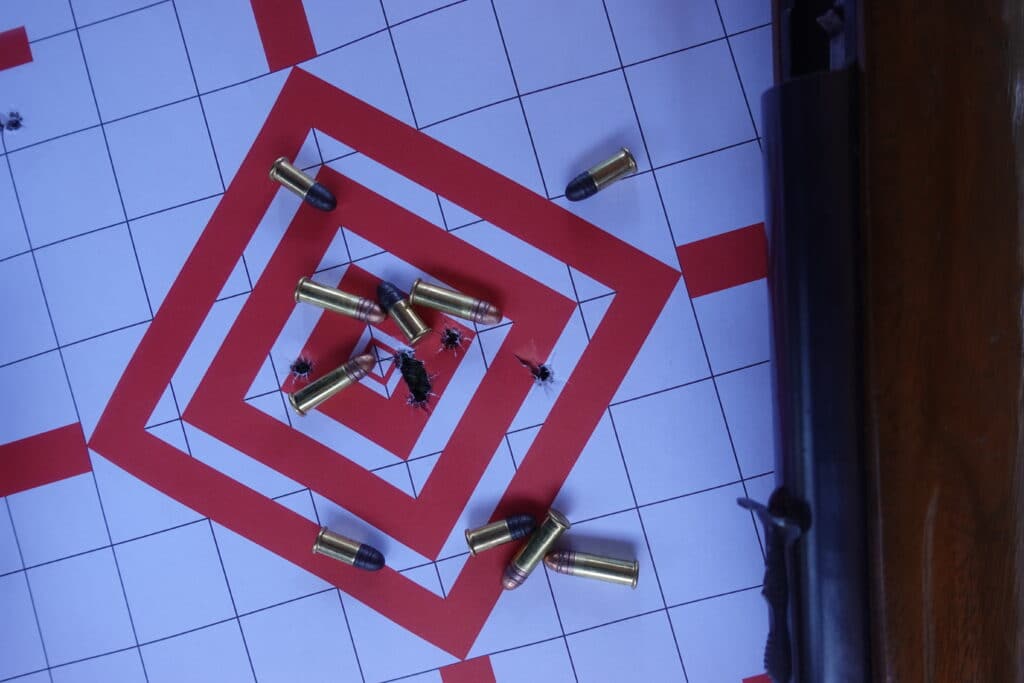
A Lot Drawbacks
While both cartridges can still be used, there’s no question that the .22LR has supplanted both of it’s predecessors for almost every use. The .22LR can be made subsonic, is cheaper due to mass production and wider market demand, and has enough power to reliably kill animals up to the size of coyotes.
Heck, the 22LR can even be used for self defense and hunting medium game like hogs and deer, though these uses are not recommended and may be illegal! The point is, the .22LR is accurate, popular, more powerful, and far more flexible than the .22 Short and .22 Long.
Flexibility
As stated, the .22LR can be used for a wide variety of tasks. Can the .22 Short and .22 Long technically do the same things as the Long Rifle? Sure. They can be subsonic, lethal to people and critters, and both have their own niche market. If there was no use for these rimfires then no one would be making them in 2022. However, the use of both the Short and Long is limited.
Range
The .22 Short is good to around 70 yards or so as a squirrel round. Basically, if you can find a squirrel in a tree, the .22 Short can kill it. Similarly, the .22 Long has a slightly longer range. Figures vary wildly but they seem to average out at around 100 yards. That isn’t too shabby and shouldn’t be overlooked for a varmint hunter taking game in the woods or from the roadside.
However, the .22LR can be reliably used out to 200 yards at squirrel-sized game and can reliably take a coyote at 30 yards or so. That’s pretty impressive for such a small, cheap round. The Long Rifle makes for an excellent farm and ranch gun as well as a target gun, hence why Olympians use the .22LR and precision rifle organizations like NRL22 exist.
Speed and Energy
The .22 Short is limited to around 1,050 fps at the muzzle. An especially hot load in a long barrel might reach 1,100 fps but those are outliers. The .22 Long has a slightly heavier bullet offsetting the slight increase in powder, so it’s velocity is in the same league as the .22 Short. 1,070 fps seems to be about average in modern offerings, but realistically it isn’t any different from the Short.
In contrast, the .22LR can be loaded really hot, achieving 1,700 fps. It can also be loaded slow, down to around 950 fps. This is a big reason why the .22LR is more flexible.
While the .22LR produces about 130 ft-lbs of energy at the muzzle on average, with the round touching 200 ft-lbs with hyper-velocity cartridges. The .22 Short maxes out at around 80 ft-lbs at the muzzle and the .22 Long can’t do much better. The .22 Long can be loaded hotter than the Short but that brings up another issue…
Accuracy
All three .22 rimfires are not exactly speed demons. That is actually a good thing though because the rounded nose bullet shape travels much better at slower speeds. A well balanced .22LR is very accurate out to 200 yards or so, with 300 yard accuracy still being pretty good in a match gun.
While both the .22 Short and Long can be accurate in purpose-built rifles, most people will use these calibers in a gun designed primarily for .22LR. Since the rifling isn’t engaged instantly with the shorter cartridges there is more room for a bullet to become slightly unbalanced or engage the rifling off-axis.
Like a football thrown with a less-than perfect spiral, an off-axis bullet will wobble in the air and become more susceptible to wind shear. It will also naturally deviate from it’s path. At short range, this isn’t an issue since we are talking about a fraction of an inch at 20 yards. But at longer ranges the altered flight path can significantly change point of impact in relation to point of aim.
Action Cycling
By far the biggest disadvantage to using the .22 Short and .22 Long in the same gun as a .22 Long Rifle is that auto-loading guns like the Ruger 10/22 likely won’t cycle properly.
The main issue is that the smaller powder volume produces less expanding gases in the chamber. Most semi-automatic rifles utilize a simple blowback action that requires a narrow range of gas pressure to work properly. Too much pressure, like from a 22 Mag, can break the action. Too little pressure, like from a .22 Short, and the action won’t cycle.
While not explicitly dangerous, making a semi-automatic rifle a single shot is quite annoying. What’s even more annoying though is having magazine feeding issues. Long Rifle magazines are designed for the .22LR cartrdige. Most can use the .22 Long without much issue but the stubby .22 Short has problems with a lot of magazine designs.
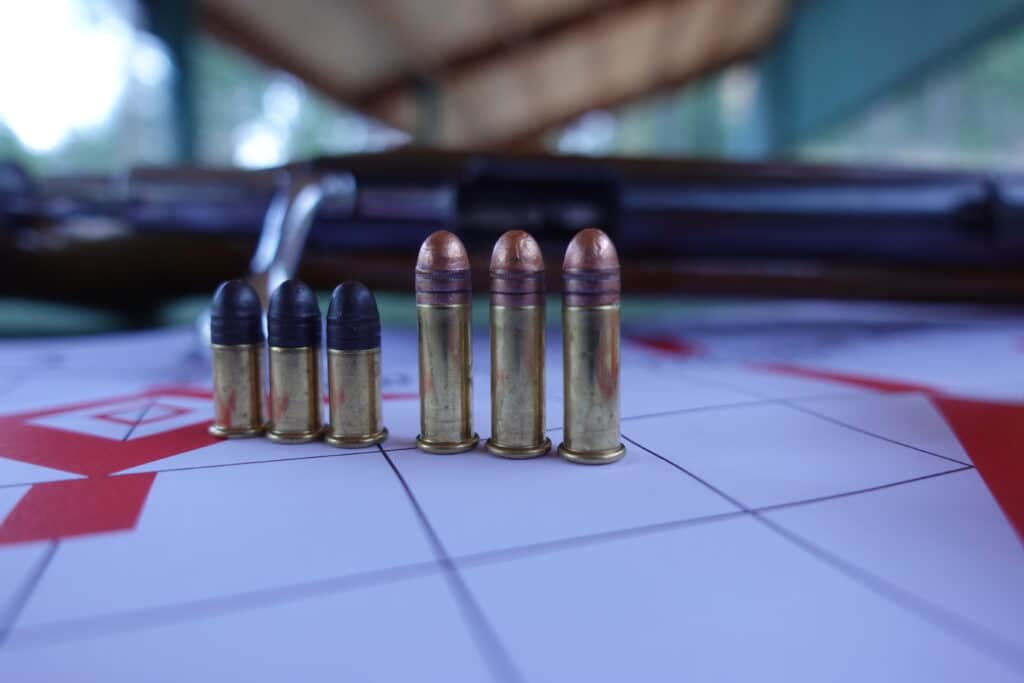
Recommended Rifles for .22 Short and .22 Long
With all these issues, it’s important to note that as long as the cartridge is properly fed into the chamber, any rifle designed for .22 LR will safely shoot a .22 Short or .22 Long cartridge. The risk of blowing up your gun is about as close to zero as operating a firearm can be. Still, I wouldn’t recommend using anything other than .22 LR in a semi automatic. They are finicky enough as it is.
A good lever or pump action design certainly gives the benefit of increased capacity via a tube magazine. If buying a modern gun and wanting this advantage, the Henry above is a good choice as are Henry’s lever gun variants.
Personally, I’m a bolt action guy. It’s a strong, safe design capable of tremendous accuracy. CZ USA is a good place to start for a modern bolt action rimfire, but there is one gun I have in mind that is plentiful, cheap, and simple enough that a child can use it.

The Winchester Model 67
The Model 67 is not an especially noteworthy gun. It is a cheap, single shot .22 rimfire rifle capable of using .22 Short, .22 Long, and .22 Long Rifle. It was produced from 1934 to 1963. The action and barrel are held in with a single screw, and the rifle is equipped with a decent set of iron sights.
We have one in the family that was a first generation model, produced somewhere between 1934 and 1937. This rifle is “Uncle Pete’s Gun”, but that was my Mother’s uncle, so my great uncle. It shot game through the later half of the great depression in North Dakota and most likely was the gun that put food on the table at a time when affording groceries from the store wasn’t always a possibility.
This gun has been in continuous use for almost a century with minimal cleaning and only one refurbishment 20 years ago. Even figuring this gun has spent half it’s life in storage, I’d put the barrel at over 20,000 rounds and still going strong.
Looking at Gunbroker, the Model 67 can be found somewhere between $200 and $300. At a pawn shop or gun show it can likely be found for less. This is in line with the cheapest brand new 10/22 variants! It’s also better quality than a Savage rascal, so this would be a good gun for kids to learn on.
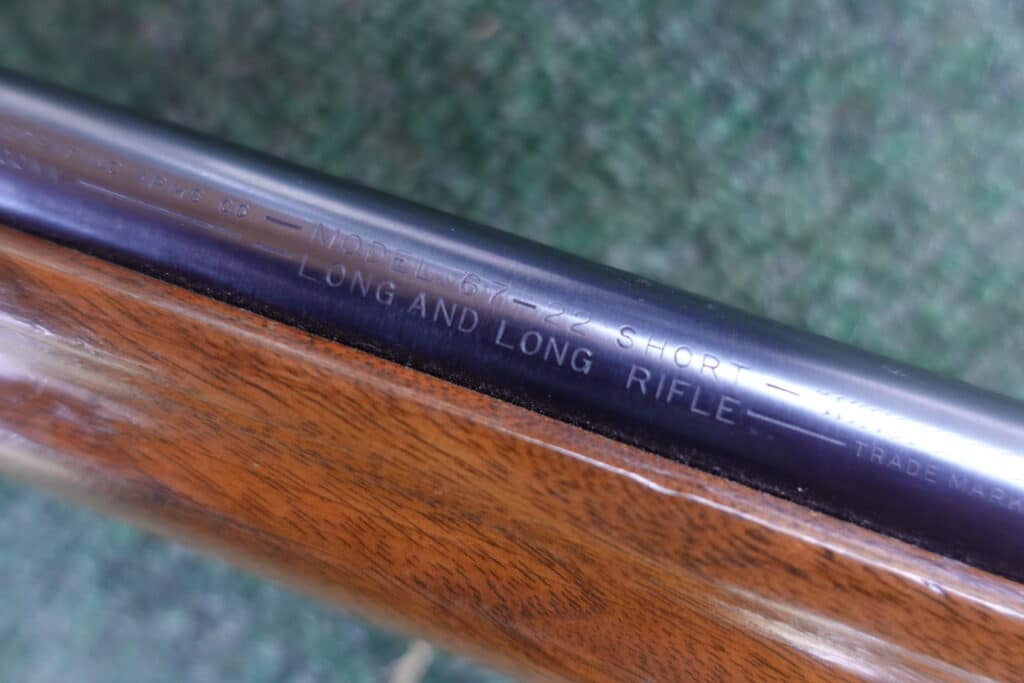
Conclusions
To answer the question in it’s simplest form, yes, 22 Short and 22 Long can be used in the same guns. The difference in pressure is minimal and besides length their dimensions are identical. Using one or the other in a gun that is chambered for both and/or 22 Long Rifle is possible. Occasionally, such a substitution can even be a good thing!
However, it is best to use the appropriate cartridge most of the time. A gun chambered for 22 Long Rifle should be use with 22 Long Rifle in most circumstances. Similarly, a rifle chambered for 22 Short or 22 Long only should NOT have 22 Lon Rifle placed in the chamber lest there be pressure issues or damage to the throat of the barrel.
When buying a gun that can use all three cartridges, look for one which says “For .22 Short, Long, and Long Rifle” or “For .22 S/L/LR”. Rifles chambered for other 22 caliber rimfire cartridges such as 22 Mag are NOT interchangeable and should be avoided.








































